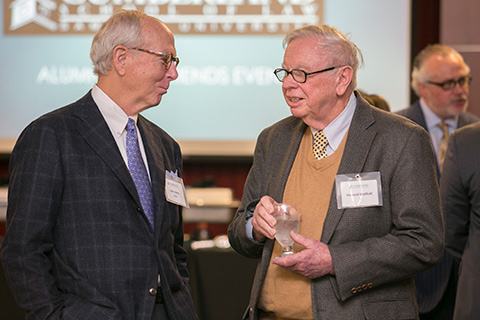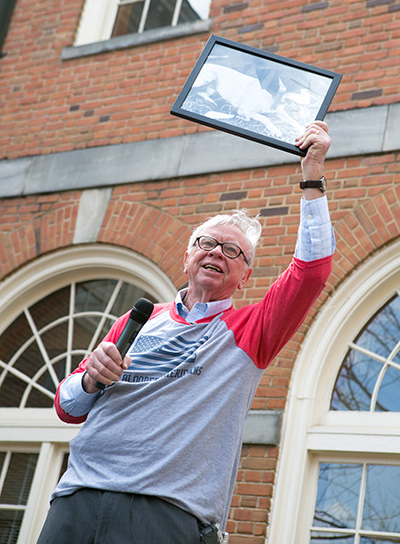
Howard Walthall’s legacy at Cumberland is even greater than one might expect from someone who has served as a professor here for the amazingly long period of 45 years.
First, Howard is a brilliant teacher. Throughout nearly half a century, Howard has imparted analytical skills, knowledge and wisdom to thousands of students in a remarkable diversity of courses, including Contracts, Bankruptcy, Taxation, Business Organizations, Equitable Remedies and Constitutional Law. His kinetic manner of speaking and infectious enthusiasm captivates any audience, whether he is teaching students, addressing bar association or faculty meetings, or providing his annual oration in tribute to Rascal.
Howard also has been a powerful force in enhancing Cumberland’s quality and reputation. He has sat on countless committees, particularly those involving curriculum, law school governance and faculty hiring. During the 1980s, he played a prime role in the movement to encourage greater faculty scholarship, and he was instrumental in the recruitment of Parham H. Williams Jr., whose transformative deanship between 1985 and 1996 moved Cumberland forward on many fronts. Howard meanwhile has been ever mindful of Cumberland’s rich history and traditions, which he, with David J. Langum Sr., chronicled in From Maverick to Mainstream: Cumberland School of Law, 1847-1997 (University of Georgia Press, 1997), one of the few law school histories that is based upon intensive research.

Never resting on his laurels, Howard has gleefully volunteered for mundane tasks that no one would expect such a senior faculty member to undertake. Likewise, he has enthusiastically advocated and embraced educational innovations, including assessment methods such as midterms. In his approach to legal education, he has remained forever young.
Howard also has made significant contributions to the betterment of the law and the legal system as a member of the American Law Institute and the Alabama Law Institute, for which he has served on various committees to reform and improve the state’s commercial law. As a preeminent expert on Alabama’s constitutional law and constitutional history, Howard also has been the source of many ideas to try to make the state’s constitution more responsive to the needs of the 21st century.
I have been privileged to have been Howard’s colleague since I came to Cumberland 32 years ago. My first impression of Howard presaged my long association with him. We first met when he was the senior member of the faculty recruitment team that conducted my screening interview at the Association of American Law Schools (AALS) job fair in Chicago in 1987. Unlike many of the faculty from 14 law schools who interviewed me that weekend, Howard was friendly and had carefully read my publications, about which he asked penetrating questions. His intellectual versatility has continued to dazzle me as he has offered insights into far-flung fields of scholarship during faculty candidate interviews and symposia of Cumberland faculty and visiting speakers. I have been particularly grateful to Howard for his encouragement of my scholarship, including his attendance at practically every Cumberland seminar at which I have spoken, his useful comments on drafts of my books and his willingness to talk informally about ideas for my research and writing. Like so many other faculty, staff and alumni, I look forward to continuing my association with Howard even as he retires from active teaching.
